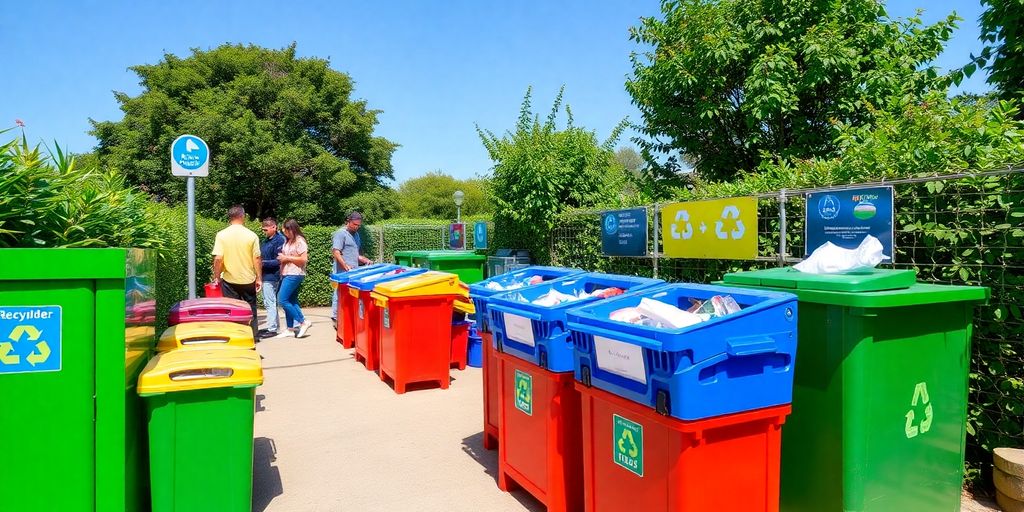Disposing of trash properly is important for keeping our communities clean and safe. This guide will help you find local options for getting rid of waste, including hazardous materials, recycling, and composting. Whether you’re cleaning out your garage or just want to know how to recycle right, we’ve got you covered!
- Discover When is Trick or Treating Near Me: Your Ultimate Guide to Halloween Fun!
- Finding Lawyers Who Sue School Districts Near Me: Your Guide to Education Law in Phoenix, AZ
- Exciting Activities: What to Do with Kids Near Me for Unforgettable Family Fun
- Discover the Perfect Couple Park Near Me: Romantic Getaways and Activities
- Discover Where to Buy Soccer Cleats Near Me: Your Ultimate Local Guide
Key Takeaways
- Always check what items are accepted at your local disposal sites.
- Schedule appointments for hazardous waste drop-off to ensure safe disposal.
- Use curbside services for regular trash and recycling needs.
- Participate in community clean-up events to help keep your area tidy.
- Consider composting as a great way to reduce waste and help the environment.
Household Hazardous Waste Disposal
Household hazardous waste (HHW) includes items that can be dangerous to your health and the environment. It’s important to dispose of these items properly. Here’s what you need to know:
You are viewing: Where Can I Take Trash Near Me? A Guide to Local Disposal Options and Facilities
Accepted Hazardous Waste Items
Some common hazardous waste items include:
- Batteries
- Paint and paint thinner
- Pesticides and fertilizers
- Fluorescent light bulbs
Scheduling a Drop-Off Appointment
To safely dispose of HHW, you can schedule a drop-off appointment. Here’s how:
- Visit your local waste management website.
- Find the HHW section.
- Choose a date and time that works for you.
Local Hazardous Waste Collection Events
Many communities hold collection events for hazardous waste. Check your local listings for:
- Dates and times of events
- Locations where you can drop off items
- Any specific items that are accepted
Remember, it’s illegal to throw away hazardous waste in regular trash. Always use designated disposal methods to keep your community safe.
For more information, you can contact your local hazardous waste program at 2514 Business Center Dr., Austin, TX 78744 or call (512) 974-4335.
Curbside Trash and Recycling Services
Curbside trash and recycling services are essential for keeping our neighborhoods clean and safe. Many cities offer these services to help residents manage their waste effectively. Here’s what you need to know:
Finding Your Local Hauler
To find your local trash hauler, you can:
- Check your city’s official website.
- Call your local government office.
- Look for community bulletins or newsletters.
Accepted Curbside Materials
Most curbside services accept a variety of materials, including:
- Regular garbage (household waste)
- Recyclables (like paper, plastic, and glass)
- Food and yard waste (for composting)
| Material Type | Accepted? |
|---|---|
| Regular Garbage | Yes |
| Recyclables | Yes |
| Food Waste | Yes |
| Yard Waste | Yes |
| Hazardous Waste | No |


Special Curbside Collection Programs
Some areas offer special collection programs for:
- Bulk items (like furniture)
- Electronics (like TVs and computers)
- Hazardous materials (like batteries and paint)
Remember, it’s important to follow your local guidelines for curbside services to ensure proper disposal and recycling.
By understanding your local curbside services, you can help keep your community clean and reduce waste effectively!
Local Landfill and Transfer Station Options
Read More : What Time Does Subway Open Near Me? A Guide to Local Hours and Locations
When it comes to disposing of waste, knowing your local landfill and transfer station options is essential. These facilities help manage waste effectively and ensure that it is processed properly.
Finding a Nearby Landfill
- Use local government websites to locate landfills in your area.
- Check community boards or local news for updates on landfill locations.
- Ask neighbors or friends for recommendations on nearby facilities.
Accepted Waste Types at Landfills
Most landfills accept a variety of waste types, including:
- Household trash
- Yard waste
- Construction debris
| Waste Type | Accepted? |
|---|---|
| Household Trash | Yes |
| Yard Waste | Yes |
| Electronics | No |
| Hazardous Waste | No |
Landfill Operating Hours and Fees
- Most landfills operate Monday through Saturday, typically from 6:00 AM to 6:00 PM.
- Fees may vary based on the type and amount of waste. Always check ahead for specific costs.
- Some facilities may offer discounts for residents or special programs.
Remember, it’s important to follow local regulations when disposing of waste. Improper disposal can lead to fines and environmental harm.
By understanding your local landfill and transfer station options, you can ensure that your waste is disposed of safely and responsibly. WM is a leading provider of comprehensive waste management, offering services such as garbage collection, recycling pickup, and dumpster rental.
Recycling Centers and Programs
Accepted Recyclable Materials
Many items can be recycled, helping to reduce waste. Here are some common recyclable materials:
- Paper: Newspapers, magazines, and cardboard.
- Plastics: Bottles and containers marked with recycling symbols.
- Metals: Aluminum cans and tin cans.
Special Recycling Programs
Some areas offer unique recycling programs to help residents recycle more effectively. These may include:
- E-waste recycling: For old electronics like computers and TVs.
- Textile recycling: For clothes and fabric items.
- Composting programs: For organic waste like food scraps.
Finding a Local Recycling Center
To locate a recycling center near you, consider these steps:
- Check your local government website for a list of centers.
- Use online search tools to find recycling facilities.
- Ask neighbors or community groups for recommendations.
Remember: Recycling helps keep our environment clean and reduces landfill waste. Participating in local recycling programs is a great way to contribute to a healthier planet!
Safe Disposal of Specific Items
Battery Disposal Options
Batteries can be harmful to the environment if not disposed of properly. Here are some safe ways to dispose of them:
- Drop-off locations: Many local stores and recycling centers accept batteries.
- Curbside pickup: Check if your waste hauler offers battery collection services.
- Community events: Participate in local hazardous waste collection events.
Paint and Paint Thinner Disposal
Disposing of paint and paint thinner requires special care. Here’s how to do it safely:
- Use up what you can: Try to use leftover paint for touch-ups.
- Dry it out: If you have leftover paint, let it dry out completely before disposal.
- Take to a facility: Many local waste facilities accept paint for safe disposal.
Fluorescent Light Bulb Disposal
Fluorescent bulbs contain small amounts of mercury, making them hazardous. Follow these steps for safe disposal:
- Check local regulations: Some areas have specific rules for disposing of fluorescent bulbs.
- Use a recycling center: Many recycling centers accept these bulbs for safe processing.
- Participate in collection events: Look for community events that focus on hazardous waste disposal.
Remember: It’s illegal and unsafe to throw hazardous waste in the trash or down the drain. Always seek proper disposal methods to protect the environment.
| Item Type | Disposal Method |
|---|---|
| Batteries | Drop-off, curbside, events |
| Paint and Thinner | Use up, dry out, facility drop-off |
| Fluorescent Bulbs | Recycling center, collection events |
Community Clean-Up Events
Upcoming Clean-Up Events
Community clean-up events are a great way to get involved and help improve your neighborhood. Here are some upcoming events you might want to join:
- Great American Cleanup: This event focuses on litter and debris removal from roadsides, highways, shorelines, and waterways.
- Local park clean-ups: Many parks host regular clean-up days to keep the area beautiful.
- Neighborhood block parties: Some communities organize clean-up days alongside fun activities.
Accepted Items at Clean-Up Events
Read More : Discover the Hidden Gems: Bakery Shops Near Me for Sweet Delights
When participating in clean-up events, it’s important to know what items you can bring. Generally, you can dispose of:
- Trash: General waste that cannot be recycled.
- Recyclables: Items like paper, plastic, and glass that can be processed.
- Yard waste: Leaves, branches, and other organic materials.
How to Participate in a Clean-Up Event
Getting involved in a clean-up event is easy! Here’s how:
- Find an event: Check local community boards or websites for upcoming clean-up events.
- Sign up: Many events require registration, so be sure to sign up in advance.
- Bring supplies: If possible, bring gloves, trash bags, and any other tools you might need.
Participating in clean-up events not only helps the environment but also builds community spirit.
Composting and Green Waste Disposal
Composting is a great way to reduce waste and create nutrient-rich soil for your garden. It’s an eco-friendly solution that benefits both you and the environment.
Setting Up a Home Compost Bin
- Choose a Location: Find a dry, shady spot in your yard.
- Select a Bin: You can buy a compost bin or make one from wood pallets.
- Add Materials: Include kitchen scraps, yard waste, and dry leaves.
Local Composting Facilities
Many communities offer composting facilities where you can drop off your green waste. Here are some options:
| Facility Name | Address | Operating Hours |
|---|---|---|
| Riverside Compost Center | 123 Greenway Drive, Riverside | Mon-Sat, 8 AM – 5 PM |
| Eco-Friendly Facility | 456 Nature Lane, Riverside | Tue-Sun, 9 AM – 4 PM |
Accepted Green Waste Materials
You can compost a variety of materials, including:
- Fruit and vegetable scraps
- Grass clippings
- Leaves and small branches
Composting not only reduces waste but also enriches the soil, helping plants grow better. It’s a win-win for everyone!
Final Thoughts on Local Trash Disposal
Finding the right place to dispose of your trash is important for keeping our community clean and safe. Whether you have regular waste, recycling, or hazardous items, there are many options available to you. Always check with your local waste management services to learn about drop-off locations, curbside pickup, and special collection events. Remember, it’s not just about getting rid of waste; it’s about doing it the right way. If you have any questions or need help, don’t hesitate to reach out to your local waste management office. Together, we can make a difference!
Frequently Asked Questions
What should I do with old batteries?
You can drop off old batteries at local hazardous waste facilities or recycling centers. Some curbside services also pick them up.
How do I schedule a drop-off for hazardous waste?
To schedule a drop-off, contact your local hazardous waste facility. They usually provide free appointments for residents.
What items are accepted at recycling centers?
Recycling centers typically accept paper, cardboard, plastics, and metals. Check with your local center for specific guidelines.
Can I throw away paint in the regular trash?
No, paint is considered hazardous waste. You should take it to a special collection event or a hazardous waste facility.
What is a community clean-up event?
Community clean-up events are organized gatherings where volunteers help clean up local areas. You can bring items that need to be disposed of safely.
How can I start composting at home?
To start composting, you can set up a compost bin in your backyard. Collect kitchen scraps and yard waste, and mix them in the bin to create compost.
Soure: https://herego.net
Category: near me


